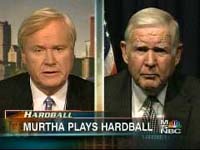|
1. Barnes and Kondracke Castigate Press Corps for Questions to Bush
During the panel segment on Wednesday's Special Report with Brit Hume on FNC, Fred Barnes and Morton Kondracke criticized and ridiculed the questions posed by the White House press corps during the morning's presidential press conference in the Rose Garden. Kondracke pointed out how "there was hardly any question, critical question from the right," such as about how Bush was following a misguided Clintonite path on Iran or how not enough troops are being allocated to securing Baghdad. Barnes mockingly recited what upset him: "The President just went on a trip to Iraq to demonstrate that he's not pulling out the troops right away. If you couldn't realize that that's what that trip was partially about, you're an idiot. And yet the first question was about a troop pullout. The second question was about getting out of Guantanamo. I mean, it just went on and on. Two questions about Karl Rove. Karl Rove has just been vindicated, and these questions were, 'Mr. President, now really, now he may not be indicted but he really did bad stuff, right? Tell us about it.' Come on. This is, these are obsessions of reporters that don't match the feelings of the American people."
2. NBC's David Gregory Refers to Karl Rove "Eluding Prosecution"
Using language which painted Karl Rove as a guilty party who succeeded at avoiding capture by authorities, not proving his innocence, in his NBC Nightly News story on Wednesday (also carried at the top of MSNBC's Countdown) about President George W. Bush's morning Rose Garden press conference, David Gregory asserted: "Mr. Bush dodged several questions about Karl Rove eluding prosecution in the CIA leak case." The Oxford Concise Dictionary, built into the Corel WordPerfect I used to write this, defines "elude" as "evade or escape adroitly from." Dictionary.com offers: "To evade or escape from, as by daring, cleverness, or skill." Their illustrative example in a sentence: "The suspect continues to elude the police."
3. CBS Stresses Negative in Poll on Iraq, Downplays Expected Success
"Here's a lovely example of liberal media bias," James Taranto commended in his Tuesday "Best of the Web" e-mail for OpinionJournal.com as he outlined how "a CBS poll finds that 60 percent of Americans say it's likely 'that the United States will ultimately find success in Iraq,'" up five points from a survey a month earlier, "and more than 50 percent say 'Iraq will eventually become a stable democracy.' So is the headline, 'Majority of Americans Foresee Success in Iraq'? Nope, it's 'Poll: Zarqawi Death Has Little Impact.'" Taranto's report stuck to the CBS News Web posting, but Monday's CBS Evening News reported only one finding from the poll: How the killing of Zarqawi didn't give an approval bounce to President Bush.
4. Matthews: Big Donors Making Democrats Too Conservative & Pro-War
In the Clinton years, Clinton fans loathed Chris Matthews, locating him firmly inside the Vast Right-Wing Conspiracy. In the Bush years, Matthews is whacked regularly by the left and by the right. On Monday, the MRC's Geoff Dickens noticed, Matthews sounded just like another disgruntled member of MoveOn.org as he interviewed John Murtha. Matthews presumed the Democrats are too conservative: "Why are the Democrats so conservative on this war?" AUDIO&VIDEO
 Barnes and Kondracke Castigate Press Barnes and Kondracke Castigate Press
Corps for Questions to Bush
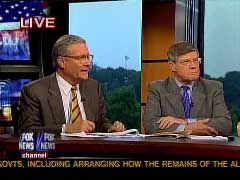 During the panel segment on Wednesday's Special Report with Brit Hume on FNC, Fred Barnes and Morton Kondracke criticized and ridiculed the questions posed by the White House press corps during the morning's presidential press conference in the Rose Garden. Kondracke pointed out how "there was hardly any question, critical question from the right," such as about how Bush was following a misguided Clintonite path on Iran or how not enough troops are being allocated to securing Baghdad.
During the panel segment on Wednesday's Special Report with Brit Hume on FNC, Fred Barnes and Morton Kondracke criticized and ridiculed the questions posed by the White House press corps during the morning's presidential press conference in the Rose Garden. Kondracke pointed out how "there was hardly any question, critical question from the right," such as about how Bush was following a misguided Clintonite path on Iran or how not enough troops are being allocated to securing Baghdad.
Barnes proposed: "These questions tell you what reporters are interested in and not what is really important or what the American people would like to hear about." Barnes mockingly recited what upset him: "The President just went on a trip to Iraq to demonstrate that he's not pulling out the troops right away. If you couldn't realize that that's what that trip was partially about, you're an idiot. And yet the first question was about a troop pullout. The second question was about getting out of Guantanamo. I mean, it just went on and on. Two questions about Karl Rove. Karl Rove has just been vindicated, and these questions were, 'Mr. President, now really, now he may not be indicted but he really did bad stuff, right? Tell us about it.' Come on. This is, these are obsessions of reporters that don't match the feelings of the American people." Barnes also zeroed in on "preening by some reporter with a gotcha question. Ridiculous."
[This item was posted Wednesday night on the MRC's blog, NewsBusters.org: newsbusters.org ]
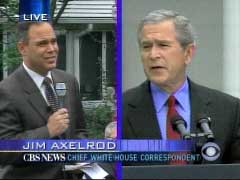 My two favorite questions not specifically scolded by Barnes or Kondracke -- First, the effort by CBS's Jim Axelrod to get Bush to admit doubt: "Do you ever have a moment where you feel this just won't end well, that no matter how many Zarqawis are killed, the insurgents are just never going to give up?" Second, Ann Compton, the ABC News radio reporter: "Do you see, as some of your critics do, a parallel between what's going on in Iraq now and Vietnam?" Bush snapped back: "No."
My two favorite questions not specifically scolded by Barnes or Kondracke -- First, the effort by CBS's Jim Axelrod to get Bush to admit doubt: "Do you ever have a moment where you feel this just won't end well, that no matter how many Zarqawis are killed, the insurgents are just never going to give up?" Second, Ann Compton, the ABC News radio reporter: "Do you see, as some of your critics do, a parallel between what's going on in Iraq now and Vietnam?" Bush snapped back: "No."
The nine questions, at the 9:45am EDT Rose Garden event, which Barnes and Kondracke criticized or were reflective of the type they chastised:
-- Nedra Pickler, AP: "You said yesterday that a standard of no violence in Iraq is an impossible standard to meet, but do you believe that there needs to be a reduction in violence for U.S. troops to begin to draw down? And if so, how much?"
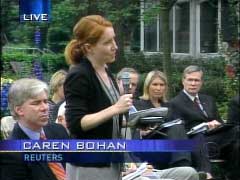 -- Caren Bohan, Reuters: "You expressed serious concern when you learned about the Guantanamo suicides, and you and your aides immediately called allies. I'm wondering, how concerned are you about the U.S. image abroad, based on this incident and the ongoing investigation in Haditha and Abu Ghraib and other incidents? And, also, why shouldn't Guantanamo be closed now?"
-- Caren Bohan, Reuters: "You expressed serious concern when you learned about the Guantanamo suicides, and you and your aides immediately called allies. I'm wondering, how concerned are you about the U.S. image abroad, based on this incident and the ongoing investigation in Haditha and Abu Ghraib and other incidents? And, also, why shouldn't Guantanamo be closed now?"
-- David Gregory, NBC News: "You've made a public point recently of soliciting outside advice about the way forward in Iraq and retooling your strategy. I wonder what idea from a critic or somebody outside your administration that you've concluded should be part of the strategy going forward?"
-- Sheryl Stolberg, New York Times: "Polls show that the public thinks Democrats can do a better job of running the country than Republicans. Are you concerned that Republicans will lose control of Congress in November? And do you think there's anything you could have done differently to put them in a better position, coming up in the midterms?"
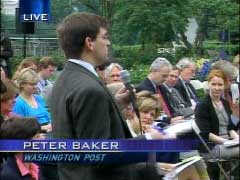 -- Peter Baker, Washington Post: "When you ran for office for the first time, you said you would hold the White House to a higher ethical standard. Even if Karl Rove did nothing illegal, I wonder whether you can say now whether you approve of his conduct in the CIA leak episode, and do you believe he owes Scott McClellan or anyone else an apology for misleading them?"
-- Peter Baker, Washington Post: "When you ran for office for the first time, you said you would hold the White House to a higher ethical standard. Even if Karl Rove did nothing illegal, I wonder whether you can say now whether you approve of his conduct in the CIA leak episode, and do you believe he owes Scott McClellan or anyone else an apology for misleading them?"
-- Jim Axelrod, CBS News: "I'm wondering, though, if there are ever moments of doubt about your decisions and strategy in Iraq. Do you ever have a moment where you feel this just won't end well, that no matter how many Zarqawis are killed, the insurgents are just never going to give up?"
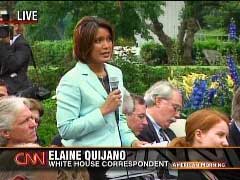 -- Elaine Quijano, CNN: "What kind of signal do you think it sends to the Iraqi people that your administration notified the leader of Iraq's sovereign government only five minutes beforehand of your arrival? And was there a specific security concern about either Prime Minister Maliki's inner circle or others that led you to make that decision?"
-- Elaine Quijano, CNN: "What kind of signal do you think it sends to the Iraqi people that your administration notified the leader of Iraq's sovereign government only five minutes beforehand of your arrival? And was there a specific security concern about either Prime Minister Maliki's inner circle or others that led you to make that decision?"
-- Ann Compton, ABC News: "Yesterday while you were gone, Senator Kerry, who was your challenger in the last election-"
Bush: "I remember that."
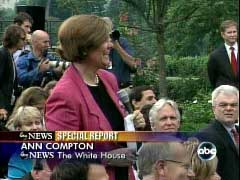 Compton: "You remember that. He said he now regrets his votes on the war. And, actually, I think Senator Clinton at the same meeting, actually heard some boos when she said that she did not support a timetable for withdrawal. Do you see, as some of your critics do, a parallel between what's going on in Iraq now and Vietnam?" Compton: "You remember that. He said he now regrets his votes on the war. And, actually, I think Senator Clinton at the same meeting, actually heard some boos when she said that she did not support a timetable for withdrawal. Do you see, as some of your critics do, a parallel between what's going on in Iraq now and Vietnam?"
Bush: "No."
-- Peter Wallstein, Los Angeles Times: "Following up on the other Peter's question about Karl Rove, you said that you were relieved with what happened yesterday. But the American public, over the course of this investigation, has learned a lot about what was going on in your White House that they didn't know before, during that time, the way some people were trying to go after Joe Wilson, in some ways. I'm wondering if, over the course of this investigation, that you have learned anything that you didn't know before about what was going on in your administration. And do you have any work to do to rebuild credibility that might have been lost?"
For the White House's transcript of the entire event: www.whitehouse.gov
Now, much of the first panel segment on the June 14 Special Report with Brit Hume on FNC, provided by the MRC's Brad Wilmouth who corrected the closed-captioning against the video, starting after a collage of questions posed and then panelist Mara Liasson of NPR defending the tone of the questions:
Morton Kondracke, Executive Editor of Roll Call: "Well, I mean, it is the role of the press to ask challenging questions of the President. I thought he, in general, he handled them feistily and, you know, for somebody who's jet-lagged and all that, rather more feisty than usual even. What's interesting, though, is that there was hardly any question, critical question from the right, which you might call the Weekly Standard side of the fence. For example, this deal-"
Brit Hume: "Let me just ask you a question about that. And which news organization every day represents the Weekly Standard side of events?"
Kondracke: "Well, I don't think there is one. So, but, for example, I mean, critics say that the deal that you're offering Iran on nuclear weapons is a lot like the deal that Bill Clinton offered to North Korea, and he got taken as a result of it. Some critics say that, you know, 7200 American troops engaging in this cleansing operation of Baghdad and Ramadi-"
Hume: "-are not enough."
Kondracke: "-aren't enough, that sort of thing. You say that you're listening to General Casey. Well, you know, what about Abraham Lincoln and Winston Churchill? They didn't always follow what the Generals said, et cetera, et cetera. Not one question about that."
Fred Barnes, Executive Editor of The Weekly Standard: "Mort's exactly right, but those, Mort, were informational questions where you're trying to get the President to explain and defend the policy. Most of these questions are one where the reporters know they aren't going to get an answer. When you ask the President, 'Mr. President, your polls are terrible, tell us all the things you should have been doing that wouldn't have put you in this situation with bad polls.' What do you expect him to say? He's not going to answer that. I mean, come on. That is not an informational question."
Mara Liasson: "You guys need to go back to the White House."
Barnes: "No, we don't need to go back to the White House. These questions tell you what reporters are interested in and not what is really important or what the American people would like to hear about. I like all of Mort's questions, but when you ask the President, you know, I mean, we know what is the press corps hung up on the most? Troop pullouts. So that's the first question. The President just went on a trip to Iraq to demonstrate that he's not pulling out the troops right away. If you couldn't realize that that's what that trip was partially about, you're an idiot. And yet the first question was about a troop pullout. The second question was about getting out of Guantanamo. I mean, it just went on and on. Two questions about Karl Rove. Karl Rove has just been vindicated, and these questions were, 'Mr. President, now really, now he may not be indicted but he really did bad stuff, right? Tell us about it.' Come on. This is, these are obsessions of reporters that don't match the feelings of the American people."
Kondracke: "I think they do represent the concerns of some American people. They just don't represent the concerns of all the American people, and the press is not, as you might say, fair and balanced. There was Bret Baier and Jake Tapper asked straightforward informational questions. The rest of them were tendentious."
Barnes soon added, referring to CNN's Elaine Quijano: "But Brit, you didn't have the best gotcha question there. That was about, 'Mr. President, didn't you insult the new Iraqi Prime Minister by not telling him well ahead of time that you were coming?' I mean, what do you expect the President, I mean, look, that is the question that matters to the reporter, it has nothing to do with any answer that the President's going to give. It's preening by some reporter with a gotcha question. Ridiculous."
The two questions Kondracke praised:
-- ABC's Jake Tapper: "What are your feelings about discussions in the new Iraqi government of amnesty for insurgents? And regarding the oil resources in Iraq that you discussed, do you support guaranteeing the Sunnis a percentage of the oil profits, either through a new law, or through a constitutional provision?"
-- FNC's Bret Baier: "Could you characterize the worry you heard from Iraqi leaders about U.S. troop levels that you first mentioned on the flight home from Iraq? And here in the Rose Garden a week ago, you said that Zarqawi's death is an opportunity for Iraq's new government to turn the tide in this struggle. After your visit, do you truly believe that the tide is turning in Iraq?"
  NBC's David Gregory Refers to Karl Rove NBC's David Gregory Refers to Karl Rove
"Eluding Prosecution"
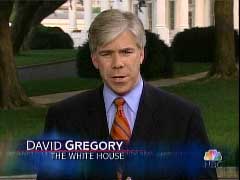 Using language which painted Karl Rove as a guilty party who succeeded at avoiding capture by authorities, not proving his innocence, in his NBC Nightly News story on Wednesday (also carried at the top of MSNBC's Countdown) about President George W. Bush's morning Rose Garden press conference, David Gregory asserted: "Mr. Bush dodged several questions about Karl Rove eluding prosecution in the CIA leak case." Viewers then saw this clip of Bush: "And obviously, along with others in the White House, took a sigh of relief when he made the decision he made and now we're going to move forward."
Using language which painted Karl Rove as a guilty party who succeeded at avoiding capture by authorities, not proving his innocence, in his NBC Nightly News story on Wednesday (also carried at the top of MSNBC's Countdown) about President George W. Bush's morning Rose Garden press conference, David Gregory asserted: "Mr. Bush dodged several questions about Karl Rove eluding prosecution in the CIA leak case." Viewers then saw this clip of Bush: "And obviously, along with others in the White House, took a sigh of relief when he made the decision he made and now we're going to move forward."
The Oxford Concise Dictionary, built into the Corel WordPerfect I used to write this, defines "elude" as "evade or escape adroitly from." Dictionary.com offers: "To evade or escape from, as by daring, cleverness, or skill." Their illustrative example in a sentence: "The suspect continues to elude the police."
Dictionary.com's definition: dictionary.reference.com
[This item was posted Wednesday night on the MRC's blog, NewsBusters: newsbusters.org ]
  CBS Stresses Negative in Poll on Iraq, CBS Stresses Negative in Poll on Iraq,
Downplays Expected Success
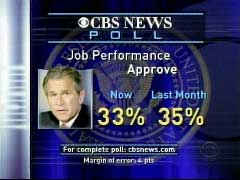 "Here's a lovely example of liberal media bias," James Taranto commended in his Tuesday "Best of the Web" e-mail for OpinionJournal.com as he outlined how "a CBS poll finds that 60 percent of Americans say it's likely 'that the United States will ultimately find success in Iraq,'" up five points from a survey a month earlier, "and more than 50 percent say 'Iraq will eventually become a stable democracy.' So is the headline, 'Majority of Americans Foresee Success in Iraq'? Nope, it's 'Poll: Zarqawi Death Has Little Impact.'" Taranto's report stuck to the CBS News Web posting, but Monday's CBS Evening News reported only one finding from the poll: How the killing of Zarqawi didn't give an approval bounce to President Bush.
"Here's a lovely example of liberal media bias," James Taranto commended in his Tuesday "Best of the Web" e-mail for OpinionJournal.com as he outlined how "a CBS poll finds that 60 percent of Americans say it's likely 'that the United States will ultimately find success in Iraq,'" up five points from a survey a month earlier, "and more than 50 percent say 'Iraq will eventually become a stable democracy.' So is the headline, 'Majority of Americans Foresee Success in Iraq'? Nope, it's 'Poll: Zarqawi Death Has Little Impact.'" Taranto's report stuck to the CBS News Web posting, but Monday's CBS Evening News reported only one finding from the poll: How the killing of Zarqawi didn't give an approval bounce to President Bush.
Taranto's June 13 report relayed how the CBSNews.com posting played up the downbeat:
"Half think the level of violence in Iraq will be unchanged by Zarqawi's death, while 30 percent say it will actually lead to more attacks against U.S. forces. Just 16 percent think the number of attacks will decrease as a result of his death.
"Sixty-one percent also say Zarqawi's death won't have any impact on the terrorist threat against the United States, while 22 percent it will increase that threat. Thirteen percent predict a decreased risk of terrorism."
Taranto contended: "In some sense this all doesn't matter -- after all, these are just opinions, mostly held by people who have no more than a passing knowledge of Iraq. But CBS insists on emphasizing those results that make it appear as if Americans agree with the 'liberal,' anti-Iraq point of view."
For Taranto's June 13 "Best of the Web" compilation: www.opinionjournal.com
As noted by Taranto, the CBSNews.com summary of the poll acknowledged the public's positive long-term view:
"The poll did find some signs that Americans are becoming more optimistic about Iraq -- at least when looking at the long term. Sixty percent now say it's somewhat likely or very likely that the United States will ultimately find success in Iraq, a 5-point jump since last month. More than half of Americans also say Iraq will eventually become a stable democracy, though it will take more than a year or two."
For the CBSNews.com summary posted Monday night, June 12: www.cbsnews.com
Bob Schieffer's total coverage, on Monday's CBS Evening News, of the CBS News poll: "Eliminating Zarqawi may have been a significant military achievement, but it did not seem to help the President from the standpoint of domestic politics. In a CBS News poll out tonight, only 33 percent of those polled said that they approve of the job the President is doing. That is about the same as last month. It was much different when Saddam Hussein was captured and the President got a six-point bounce [from 52 to 58 percent] in the polls."
  Matthews: Big Donors Making Democrats Matthews: Big Donors Making Democrats
Too Conservative & Pro-War
[This item is adopted from a Wednesday posting, by the MRC's Tim Graham, on our NewsBusters blog: newsbusters.org ]
Matthews elaborated on the June 12 program: "I was looking at the, the, the fundraising money. Is the fact that the Democrats are getting a lot of fat cat money now, more conservative people contributing to the party, an explanation of, if you were getting your money from college professors, you wouldn't have this problem. You're getting it from rich people. You're catching up, in fact, passing the Republicans in fundraising. Is this steering the Democratic party to a more conservative position on the war, the money?"
He suggested to Murtha that Democrats would be more electable if they were more like Dennis Kucinich:
"Why should the Democrats rule the Congress if you can only scrape up 102 members out of 202 to go your way on this war? Why should people vote anti-war and vote for Democrats, if the Democratic members won't say they're anti-war?"
Murtha: "Let me tell you, they're voting for a change in direction, and they'll vote for a change in direction. There's no question in my mind about it. We need to lead this country. We can't, if we want to win the majority back, we can't depend on the Republicans to continue to make mistake after mistake. We have to lead. And I believe I'm in that position with my expertise in defense to help Nancy Pelosi and the leadership in that direction."
Matthews: "Well, good luck, but I hear a lot of people out there, Democrats who are afraid to stake a position out, like you're doing it. I don't hear 200 Democrats out there talking the war the way you are."
At show's end, Matthews added some pessimism about the Virginia Senate race, saying he was "disturbed" that Republican Sen. George Allen would hold his seat: "I am disturbed here. Jim Webb and Harris Miller debated on this show. I have the suspicion that neither one is going to beat George Allen. What do you think?"
-- Brent Baker

Home | News Division
| Bozell Columns | CyberAlerts
Media Reality Check | Notable Quotables | Contact
the MRC | Subscribe
|





















 During the panel segment on Wednesday's Special Report with Brit Hume on FNC, Fred Barnes and Morton Kondracke criticized and ridiculed the questions posed by the White House press corps during the morning's presidential press conference in the Rose Garden. Kondracke pointed out how "there was hardly any question, critical question from the right," such as about how Bush was following a misguided Clintonite path on Iran or how not enough troops are being allocated to securing Baghdad.
During the panel segment on Wednesday's Special Report with Brit Hume on FNC, Fred Barnes and Morton Kondracke criticized and ridiculed the questions posed by the White House press corps during the morning's presidential press conference in the Rose Garden. Kondracke pointed out how "there was hardly any question, critical question from the right," such as about how Bush was following a misguided Clintonite path on Iran or how not enough troops are being allocated to securing Baghdad.  My two favorite questions not specifically scolded by Barnes or Kondracke -- First, the effort by CBS's Jim Axelrod to get Bush to admit doubt: "Do you ever have a moment where you feel this just won't end well, that no matter how many Zarqawis are killed, the insurgents are just never going to give up?" Second, Ann Compton, the ABC News radio reporter: "Do you see, as some of your critics do, a parallel between what's going on in Iraq now and Vietnam?" Bush snapped back: "No."
My two favorite questions not specifically scolded by Barnes or Kondracke -- First, the effort by CBS's Jim Axelrod to get Bush to admit doubt: "Do you ever have a moment where you feel this just won't end well, that no matter how many Zarqawis are killed, the insurgents are just never going to give up?" Second, Ann Compton, the ABC News radio reporter: "Do you see, as some of your critics do, a parallel between what's going on in Iraq now and Vietnam?" Bush snapped back: "No."  -- Caren Bohan, Reuters: "You expressed serious concern when you learned about the Guantanamo suicides, and you and your aides immediately called allies. I'm wondering, how concerned are you about the U.S. image abroad, based on this incident and the ongoing investigation in Haditha and Abu Ghraib and other incidents? And, also, why shouldn't Guantanamo be closed now?"
-- Caren Bohan, Reuters: "You expressed serious concern when you learned about the Guantanamo suicides, and you and your aides immediately called allies. I'm wondering, how concerned are you about the U.S. image abroad, based on this incident and the ongoing investigation in Haditha and Abu Ghraib and other incidents? And, also, why shouldn't Guantanamo be closed now?"  -- Peter Baker, Washington Post: "When you ran for office for the first time, you said you would hold the White House to a higher ethical standard. Even if Karl Rove did nothing illegal, I wonder whether you can say now whether you approve of his conduct in the CIA leak episode, and do you believe he owes Scott McClellan or anyone else an apology for misleading them?"
-- Peter Baker, Washington Post: "When you ran for office for the first time, you said you would hold the White House to a higher ethical standard. Even if Karl Rove did nothing illegal, I wonder whether you can say now whether you approve of his conduct in the CIA leak episode, and do you believe he owes Scott McClellan or anyone else an apology for misleading them?"  -- Elaine Quijano, CNN: "What kind of signal do you think it sends to the Iraqi people that your administration notified the leader of Iraq's sovereign government only five minutes beforehand of your arrival? And was there a specific security concern about either Prime Minister Maliki's inner circle or others that led you to make that decision?"
-- Elaine Quijano, CNN: "What kind of signal do you think it sends to the Iraqi people that your administration notified the leader of Iraq's sovereign government only five minutes beforehand of your arrival? And was there a specific security concern about either Prime Minister Maliki's inner circle or others that led you to make that decision?"  Compton: "You remember that. He said he now regrets his votes on the war. And, actually, I think Senator Clinton at the same meeting, actually heard some boos when she said that she did not support a timetable for withdrawal. Do you see, as some of your critics do, a parallel between what's going on in Iraq now and Vietnam?"
Compton: "You remember that. He said he now regrets his votes on the war. And, actually, I think Senator Clinton at the same meeting, actually heard some boos when she said that she did not support a timetable for withdrawal. Do you see, as some of your critics do, a parallel between what's going on in Iraq now and Vietnam?" 
 Using language which painted Karl Rove as a guilty party who succeeded at avoiding capture by authorities, not proving his innocence, in his NBC Nightly News story on Wednesday (also carried at the top of MSNBC's Countdown) about President George W. Bush's morning Rose Garden press conference, David Gregory asserted: "Mr. Bush dodged several questions about Karl Rove eluding prosecution in the CIA leak case." Viewers then saw this clip of Bush: "And obviously, along with others in the White House, took a sigh of relief when he made the decision he made and now we're going to move forward."
Using language which painted Karl Rove as a guilty party who succeeded at avoiding capture by authorities, not proving his innocence, in his NBC Nightly News story on Wednesday (also carried at the top of MSNBC's Countdown) about President George W. Bush's morning Rose Garden press conference, David Gregory asserted: "Mr. Bush dodged several questions about Karl Rove eluding prosecution in the CIA leak case." Viewers then saw this clip of Bush: "And obviously, along with others in the White House, took a sigh of relief when he made the decision he made and now we're going to move forward." 
 "Here's a lovely example of liberal media bias," James Taranto commended in his Tuesday "Best of the Web" e-mail for OpinionJournal.com as he outlined how "a CBS poll finds that 60 percent of Americans say it's likely 'that the United States will ultimately find success in Iraq,'" up five points from a survey a month earlier, "and more than 50 percent say 'Iraq will eventually become a stable democracy.' So is the headline, 'Majority of Americans Foresee Success in Iraq'? Nope, it's 'Poll: Zarqawi Death Has Little Impact.'" Taranto's report stuck to the CBS News Web posting, but Monday's CBS Evening News reported only one finding from the poll: How the killing of Zarqawi didn't give an approval bounce to President Bush.
"Here's a lovely example of liberal media bias," James Taranto commended in his Tuesday "Best of the Web" e-mail for OpinionJournal.com as he outlined how "a CBS poll finds that 60 percent of Americans say it's likely 'that the United States will ultimately find success in Iraq,'" up five points from a survey a month earlier, "and more than 50 percent say 'Iraq will eventually become a stable democracy.' So is the headline, 'Majority of Americans Foresee Success in Iraq'? Nope, it's 'Poll: Zarqawi Death Has Little Impact.'" Taranto's report stuck to the CBS News Web posting, but Monday's CBS Evening News reported only one finding from the poll: How the killing of Zarqawi didn't give an approval bounce to President Bush. 
